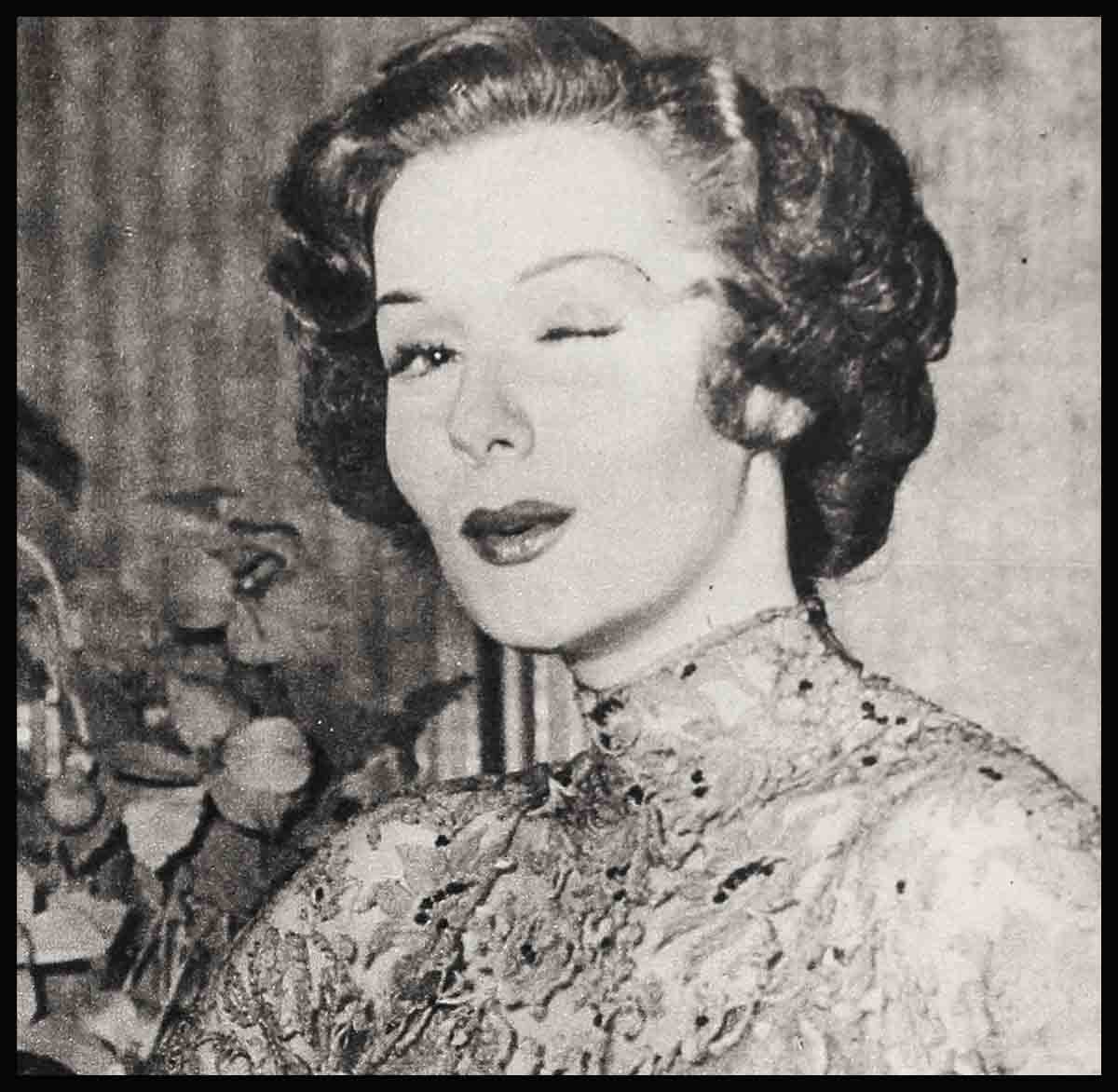
She Doesn’t Want To Be Alone!—Rhonda Fleming
“Dark glasses are silly, and all this nonsense about wanting to be alone is even sillier! The public is my boss, and they’re entitled to see the girl they ‘employ.’ Besides—it’s fun to be recognized.”
Those are the forthright words of one of Hollywood’s most beautiful stars, Rhonda Fleming.
It’s easy for her to talk, you say . . . easy for her to appear in public constantly when she is acknowledged—as Rhonda is—to be as lovely off the screen as on. But is it easy?
Hollywood is full of beauties—and many of them are regularly voted the most uncooperative in the business. Photographs of their families, homes, children—even their pets aren’t allowed. They don’t turn up for scheduled press interviews, don’t like to give autographs, and take great pains to be rude when they go on public appearance tours.
Once, Rhonda Fleming will admit, she was a little bit that way herself. “All the big names in Hollywood say they find the constant publicity, photograph-taking and autograph-giving such a bore,” remarks one of Rhonda’s friends, “and when Rhonda first made a name for herself, she thought that was the only correct way to behave.”
She quickly learned differently, however. The bigger they come, the simpler—and more cooperative—they are, Rhonda decided, and because she had theatre in her blood, it wasn’t too hard to accept the public outside the theatre as well as inside.
“Actually,” says one Hollywood producer, “Rhonda had everything in her favor. Her mother had been on the stage and bequeathed a sound knowledge of show business to her daughter. Rhonda’s grandfather was a theatrical producer in Salt Lake City. And Rhonda herself was born and brought up in Los Angeles and Beverly Hills, so she could see the theatre world in action.
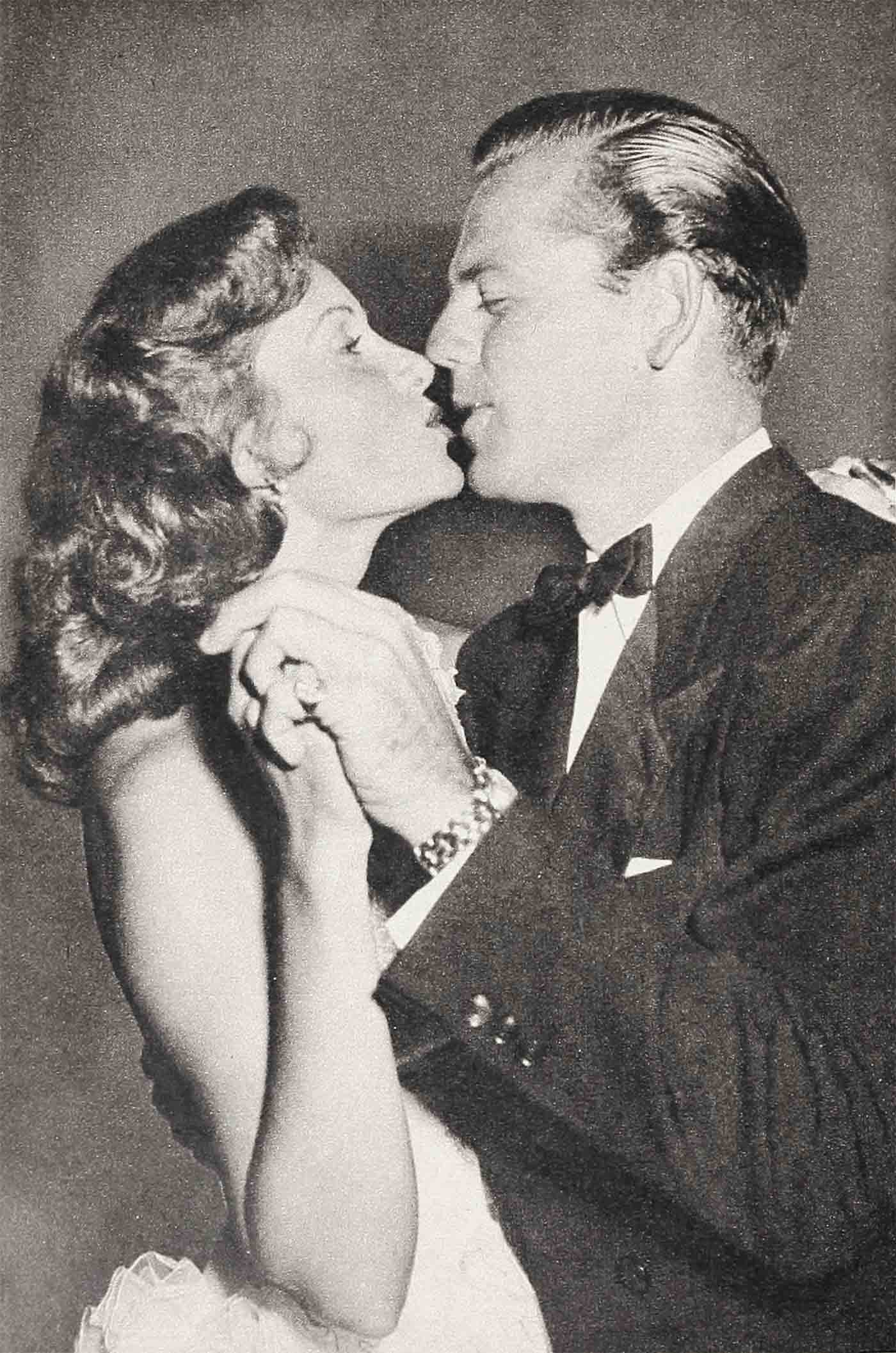
“It’s probable, I think, that she would have flowered as a public personality much sooner, but for her very early marriage,” he finishes. “She’s got the right approach to her career, but she lacked the right approach to being a woman off the screen.”
Today, Rhonda says frankly that no girl should dream of marriage before her early twenties. “I don’t regret my own early marriage,” she adds with a smile, “but I have a special reason . . . my son, Kenny! He’s my biggest fan, and without him, I wouldn’t have had as much reason to work at my career and try to advance.”
It was during those earlier days when Rhonda was working to further her career that Hollywood kept a speculative eye on her. Beauty is common in Hollywood; there’s nothing exceptional about it. Rhonda Fleming was just another beautiful girl.
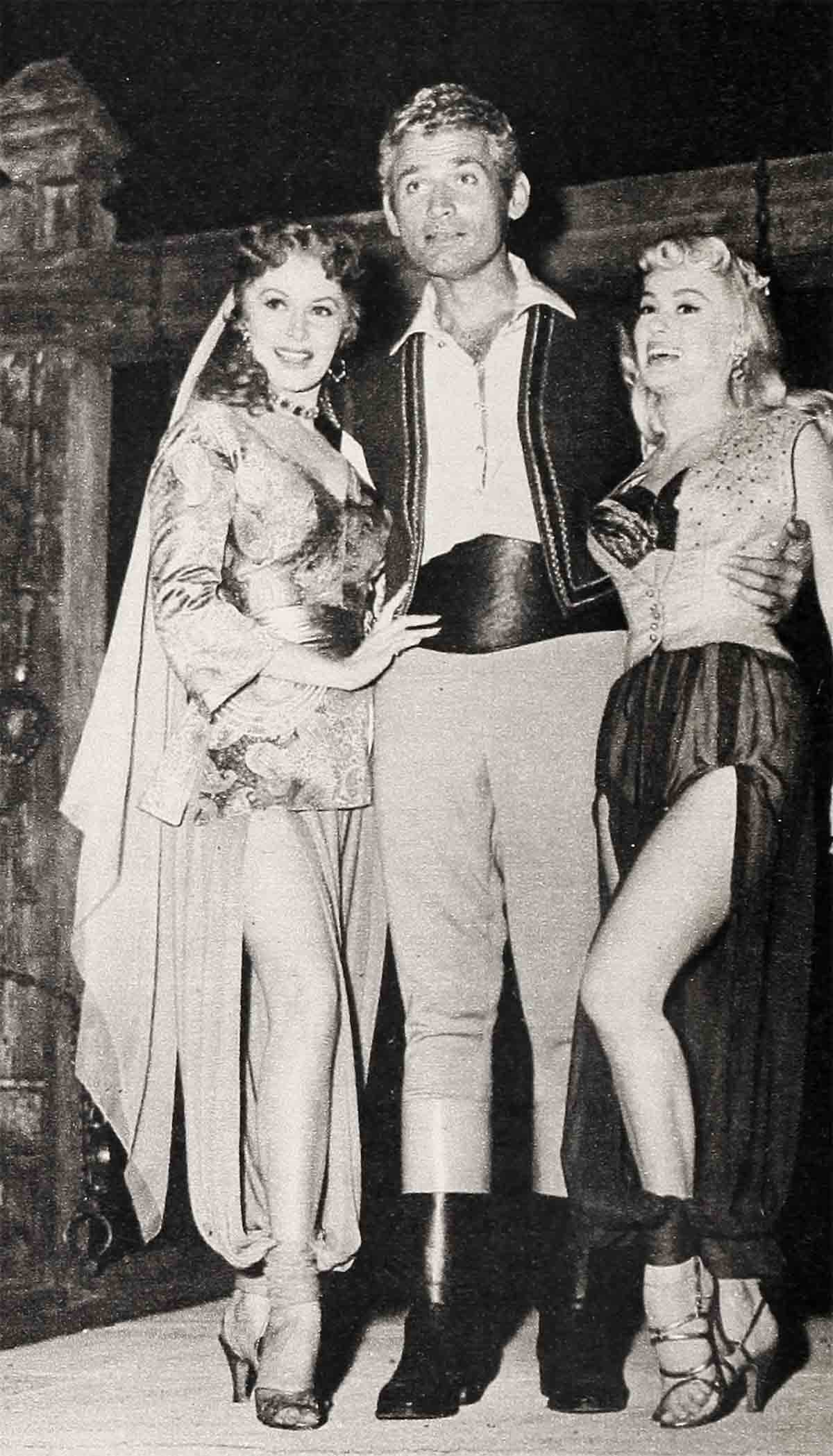
Too, Rhonda had had it easy. There was none of the rags-to-riches story about beauty coming into its own. Bred for a career in the theatre, the movies came looking for her. A talent scout saw her on a Beverly Hills street while she was still in school, and after convincing Rhonda that he was not just a fresh guy trying to pick her up, he tied her down with a three-months contract.
Rhonda spent those three months being too busy with school activities to do anything with the movies! To this very day, she behaves as though that career might end at any moment. “I believe in property as an investment for that rainy day,” she says. “I already own an office building, and I’m hoping to buy an apartment house, too.”
But if Rhonda was pretty casual about her early screen career, her marriage at sixteen failed to give her a mature perspective on her future. “She was far too young,” says one of her friends. “She was too young for everything—home, marriage, baby, even career. And everything was too easy—or so it seemed. Rhonda began to feel that she didn’t want to be in pictures.
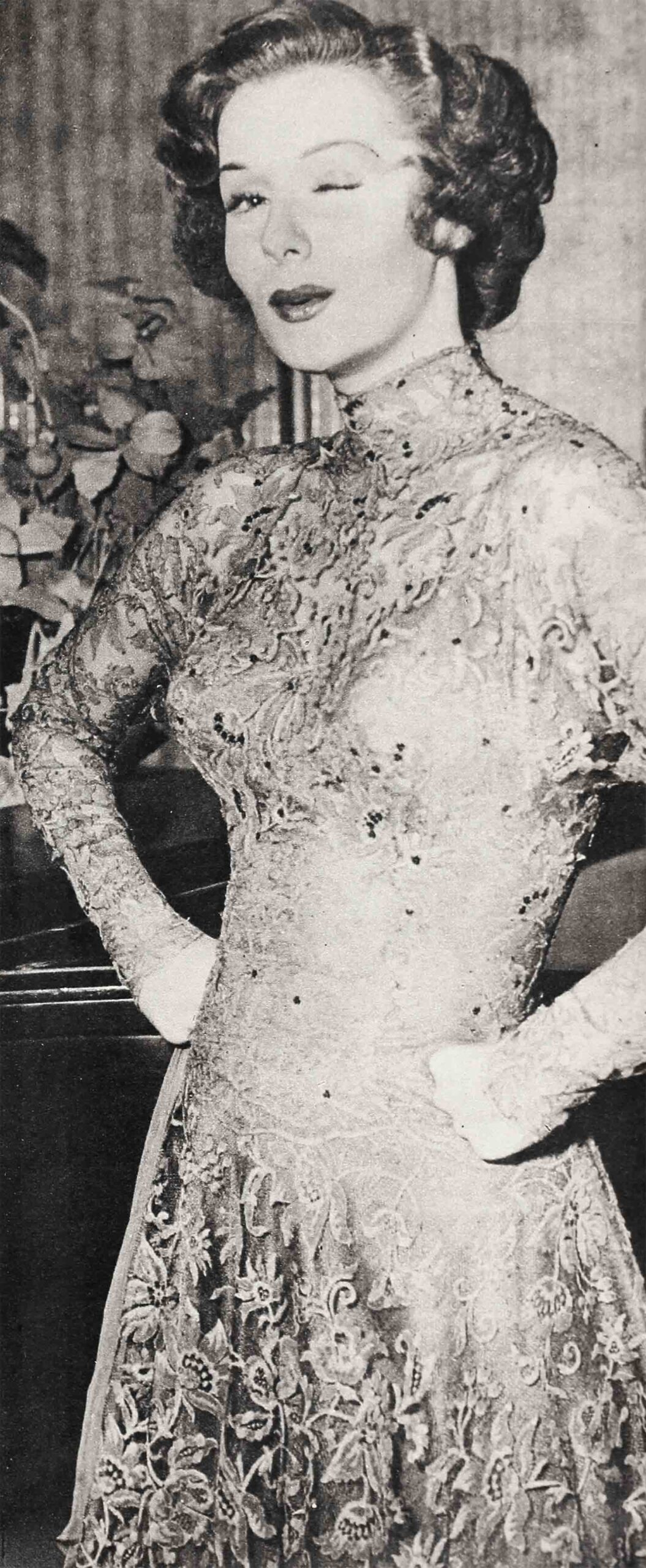
“No public appearances, no interviews, no sharing of her intimate life with her fans,” adds her friend. “Rhonda felt she was entitled to live her private life in private—and on top of that, she was inwardly bewildered, completely out of her depth, in every phase of her life.”
It’s sometimes hard to believe that Rhonda Fleming, who photographs more beautifully and more youthfully than most of the younger,stars in Hollywood, is the mother of a boy of twelve. “Kent is more like a brother,” she once told me, “and if we both believe the same thing, I’m sure the affection is no less acute.”
For a long time Rhonda was not happy with her private life. She had married a successful interior decorator, Tom Lane—but his mind was on his work. “He was a genius at furnishing homes, but he couldn’t quite completely furnish my life. He was wonderful with the main things, but sometimes the little accessories were missing.”
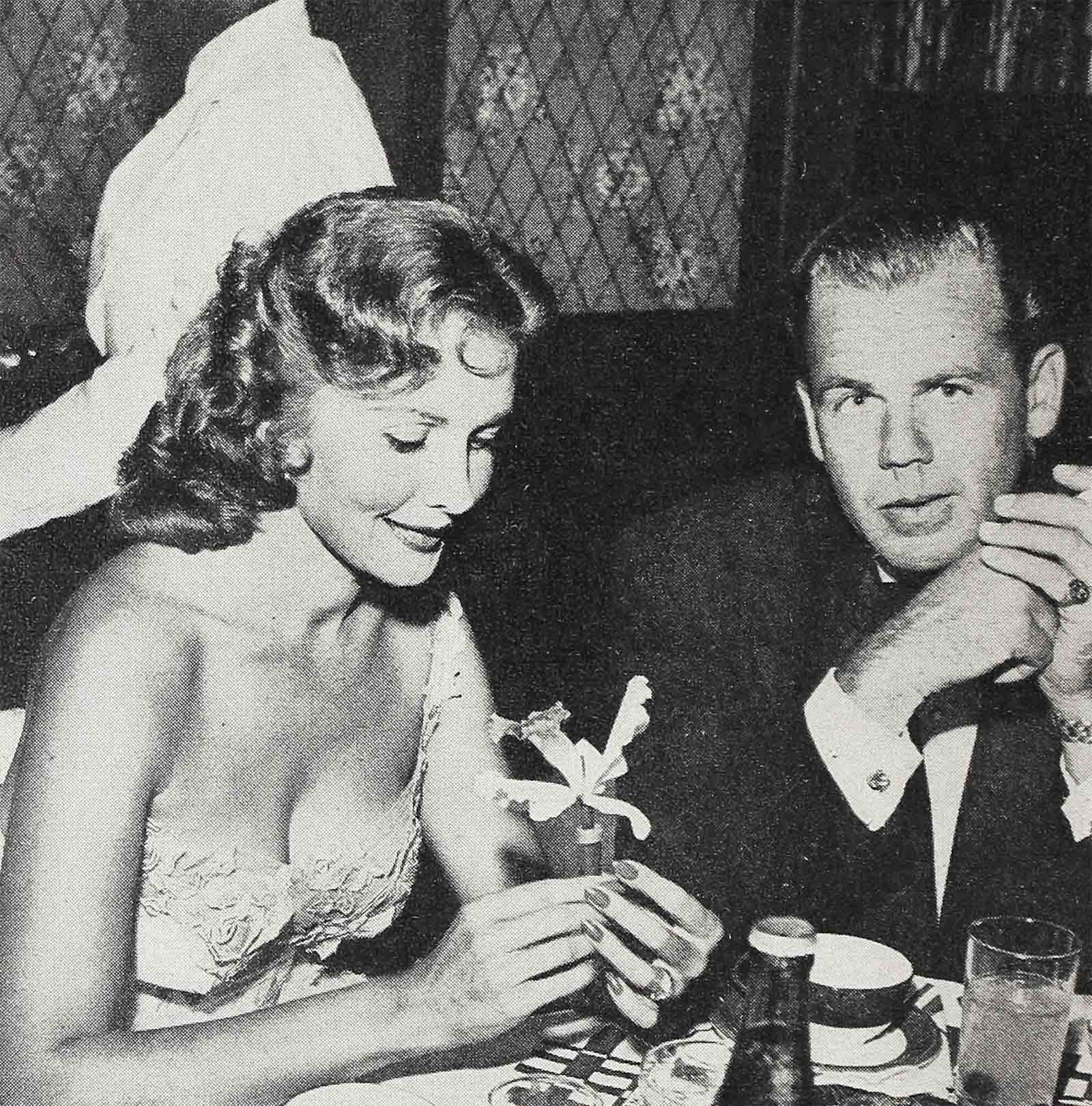
Both of them made a brave try, but it didn’t work out.
Once this writer was having cocktails with David O. Selznick, who did so much to advance her career. With us, and Rhonda, was Jennifer Jones. And we heard Jennifer say, “You put your private house in order, and you’ll soon find out that your career will take care of itself.”
And it was David who said to me, “Here is a girl who one day will be a big star, because she is uninhibited. She feels that the life of a movie star should be public property—and she would like to shine in the minds of strangers as much as she would like to satisfy herself.”
Today she is happier with Dr. Lew Morrill than she thought she could be with any man. For a while, after the break-up of her marriage, she was wooed by a hotel heir, a handsome French restaurateur, and many actors, including John Payne. But, in a man, Rhonda demanded stability.
“As an actress,” she told us, “I am doing my best. But when it comes to being a wife first and a woman second, I insist I’m a perfectionist. I would want to give a long marriage everything that I would want to give a short movie role. And if my husband wasn’t happy, I would give up the films for him.”
Thanks to the complete understanding between Lew Morrill, doctor, and Rhonda Fleming, actress, there never has been a question of sacrifice on her part. Today it’s a completely different Rhonda who appears in such pictures as “Those Red Heads From Seattle” and “Yankee Pasha.”
Of all husbands, a doctor can best understand the hectic rush and strain of a movie career. Rhonda and Lew have scant time for entertainment, it’s true, but neither of them is ever irritable with the other over a broken engagement, a party missed unavoidably, or a ruined dinner.
A friend and colleague of Dr. Morrill’s points out that much of Rhonda’s emergence into the limelight is due to the sympathetic understanding and positive physical help a doctor is qualified to give his wife.
Rhonda puts it simply. “There aren’t many people who don’t meet their bosses face to face every day at nine in the morning. In my case, the public is my boss. I do my best, before the cameras, but it’s the audience who buys the tickets. The players who hide from their fans and slink out the side entrance of a theatre or store, don’t know how much they miss in not meeting the public.
“It’s up to me to show them I’m grateful,” she says, “by letting them see what they’re buying! I only wish I could meet everybody everywhere who’s ever liked me in any of my pictures and tell them how important that liking is!
“It isn’t important just because it insures my future financially,” she smiles. “The reason it’s so important to me is that everyone wants to know, personally, when she’s done a good job. And everyone wants to say ‘thank you.’ I’d like to say ‘thank you’ to everyone. And you can’t do that if you walk around in a pair of dark glasses!”
THE END
—BY LEONE MATTHEWS
It is a quote. SCREENLAND MAGAZINE MAY 1954




